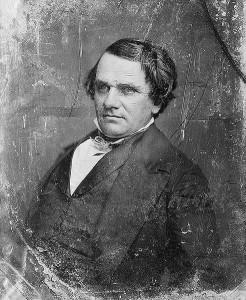And the Little Giant Agrees
From The New-York Times. November 15, 1860:
A FEW SEASONABLE WORDS.
The National Intelligencer publishes the following letter from a “Southern Cotton Planter,” whom it states, is a gentleman of high character, a native of the South, and the owner of three hundred slaves:
“As a cotton planter (and not on a small scale) of a ‘Cotton State,’ and as owner of some (not a few) Slaves, my opinion, based on my own knowledge, may have a little weight with my brethren of the South.
On the election to the Presidency of Mr. LINCOLN, according to the form, if not the spirit, of the Constitution, I see no cause for the secession from the Union of any one of the ‘Cotton States,’ to say nothing of other States. Neither interest nor honor require that step, so fatal to the State that takes it, and so disastrous to the Union. Far otherwise. Such a step would inflict injury on ourselves, on our friends and on our country, without avenging our wrongs on our enemies. The fanatics and other Abolitionists will triumph at Southern secession and Southern losses.
I will not discuss the right of secession, nor the inevitable horrors of disunion, but shall confine myself to the one point — there is no excuse for Disunion furnished by the election of Mr. LINCOLN. He has been elected according to law. With a majority of both Houses of Congress opposed to him, unsustained by the Supreme Court, President LINCOLN can do no harm to the South, nor to the country, as a mere executive officer of the Government, were he ever so much inclined to do so. He is powerless. …
We have been beaten at the ballot-box. Now, let the South give Mr. LINCOLN a fair trial. His friends, on whom reliance is to be reposed, assure us that, a President, Mr. LINCOLN will faithfully adhere to the provisions of the Constitution, as construed and understood by sound jurists at the South, and that he will protect the sovereignty and local institutions of the Southern States, Slavery and all, quite as faithfully as he will protect the rights and interests of the North and of the whole country; that he is an able and honest man, “of unimpeached integrity,” who will walk in the footsteps of HENRY CLAY and of President FILLMORE. Would not that satisfy every constitutional Union-loving Southern man? Fiat justitia!
Lincoln might not have been powerless, but, from the perspective of 2010, this writer’s assertion that Lincoln was constrained by Congress and the Supreme Court makes sense, especially if both Houses of Congress were run by the opposition. We hear about gridlock all the time now.
The same issue of The Times reported on Stephen A. Douglas’ visit to New Orleans. He was given a great reception and spoke on a couple different occasions.
Here’s a bit of the story (The New-York Times. November 15, 1860):
Senator DOUGLAS arrived in New-Orleans on Thursday last, from Mobile. He was received at the depot by a great crowd, and Hon. PIERRE SOULE made an address of welcome, to which Mr. DOUGLAS responded as follows:
Mr. CHAIRMAN: Each time I visit New-Orleans, the kindness of my friends and your citizens places me under increased obligations. I appreciate this reception. This vast crowd, in the midst of this pouring and drenching rain, and with a still darker cloud hanging over our country, calculated to depress the heart of the patriot, shows that there is yet hope for our glorious UnionThis is no time to despair or despond. The bright sun will soon chase away these clouds, and the patriots of the land, laying aside partisanship, and forgetting former partisan strife, will rally as one man, and throttle the enemies of our country. [Cheers.] Although an Abolitionist may have been elected to the Presidency of the United States, the gallant fight which the Democracy have made in the Northern States has secured Representatives enough, united with the South, to put Mr. Lincoln and his Administration in a minority in both Houses of Congress. [Cheers.] There is no act which he can do which will violate or impair the rights of any citizen of any State of this Union. [Cheers,] This is no time to indulge in crimination and recrimination. The contest for the Presidency has ended, and with it, allow the a sperities which it has engendered to pass away. [Cheers.] But we must never forget the principles on which we stand. [Cheers.] I can make any sacrifice short of principle. Men are of no consequence, principles are everything. [Cheers.] In the contest, then, with the flag of the Union over us, and non-interference by Congress on the subject of Slavery still emblazoned upon our banners, the National Democracy will drive back Abolitionism, put down sectionalism, and restore peace and harmony to this glorious country. [Cheers.] I renew to you, Sir, and to these assembled friends, my grateful acknowledgments for your kindness on this occasion. [Immense applause.]
Douglas agrees with the cotton planter that Lincoln is not going to be able to constitutionally impose Republican policy.
Was this view realistic? I have not seen any concise article about the 1860 elections results in Congress. Maybe part of the problem is that states did not vote on the same day for Congressional races. Also, when states seceded they lost their Congressional seats.
I don’t completely understand why the planter-Douglas view did not win out. The fire-eaters and South Carolina were hell-bent on secession – did they have that much power?
Thanks for any comments.


yes the fire eaters had that much power-very wealthy slaveowners or allied to the slaveowners-the 1860 association meet in private deciding the fate of the rest of the people-you’ll see that a minority decided the fate of the majority-they sold a bad bill of sale thats going to get alot of people killed
Thanks for the comment, Kevin